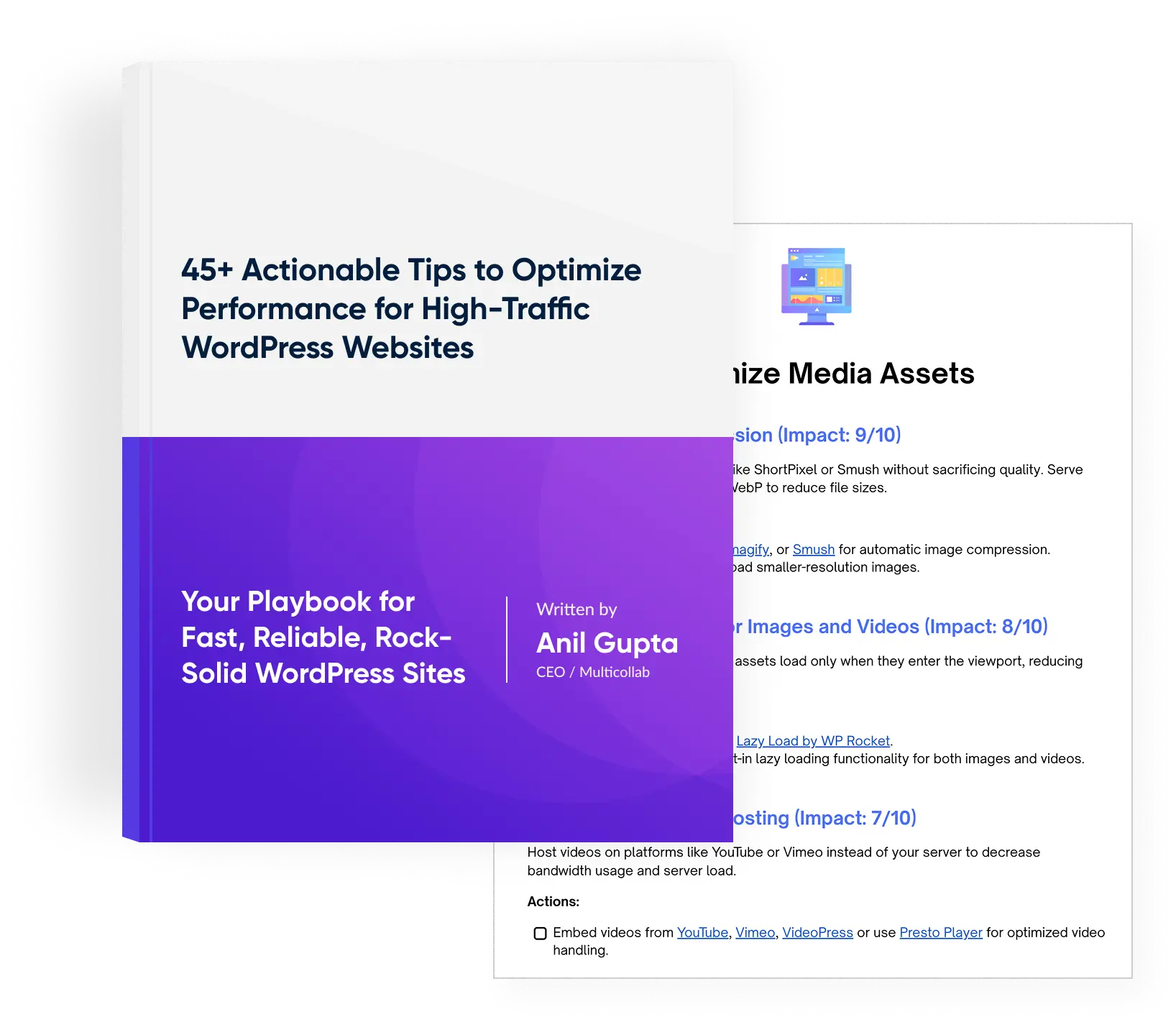Table of Contents
Running a successful content operation goes beyond creating and publishing. It’s about consistently evaluating how well your team performs. For large content teams, tracking performance is crucial to ensure efficiency, maintain high-quality standards, and meet organizational goals.
By focusing on key performance metrics, content managers can gain a deeper understanding of their team’s strengths, identify bottlenecks, and uncover opportunities for growth. These metrics act as a roadmap, guiding teams toward better collaboration and higher productivity.
With tools like Multicollab, evaluating these metrics becomes seamless. From real-time collaboration to detailed reporting, Multicollab offers the features you need to monitor performance and elevate your team’s effectiveness.
Key performance metrics for evaluating large content teams
To ensure a content team operates at peak efficiency, tracking specific metrics that offer actionable insights is crucial. Here are three key performance metrics to focus on:
1. Content output
Content output measures the volume of work your team produces. This includes the number of articles, blog posts, or other content types created within a specific timeframe and the consistency with which deadlines are met.
High output indicates an efficient workflow, but quantity alone isn’t enough. To be impactful, output must align with quality standards and deadlines.
Multicollab streamlines workflows by enabling real-time collaboration and simplifying the content review process. With features like inline comments and suggestion mode, team members can address feedback quickly, reducing delays and keeping projects on schedule.
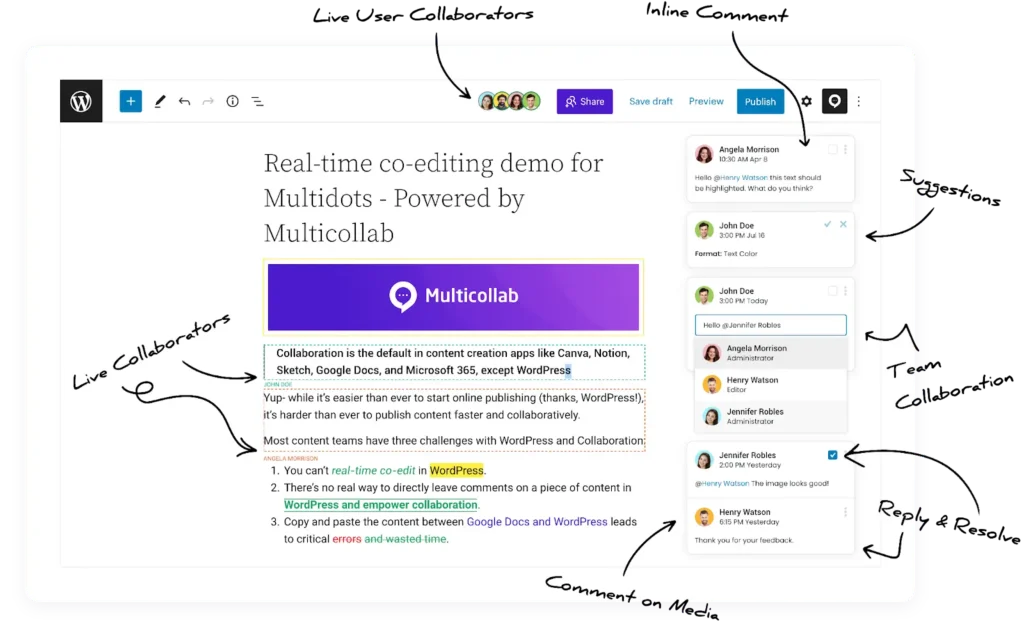
2. Content quality
Producing content in large volumes is one thing; ensuring its quality is another. Content quality can be assessed through metrics like:
User feedback: Comments and ratings from readers or clients.
Engagement metrics: Page views, shares, and time spent on content.
Revisions: Frequency and extent of revisions needed before publishing.
High-quality content reflects a team’s ability to create work that resonates with the audience while maintaining professionalism.
Multicollab’s suggestion mode allows team members to propose edits without overwriting the original content, fostering a smoother review process. Additionally, its real-time collaboration features ensure timely feedback, helping teams produce polished, error-free content.
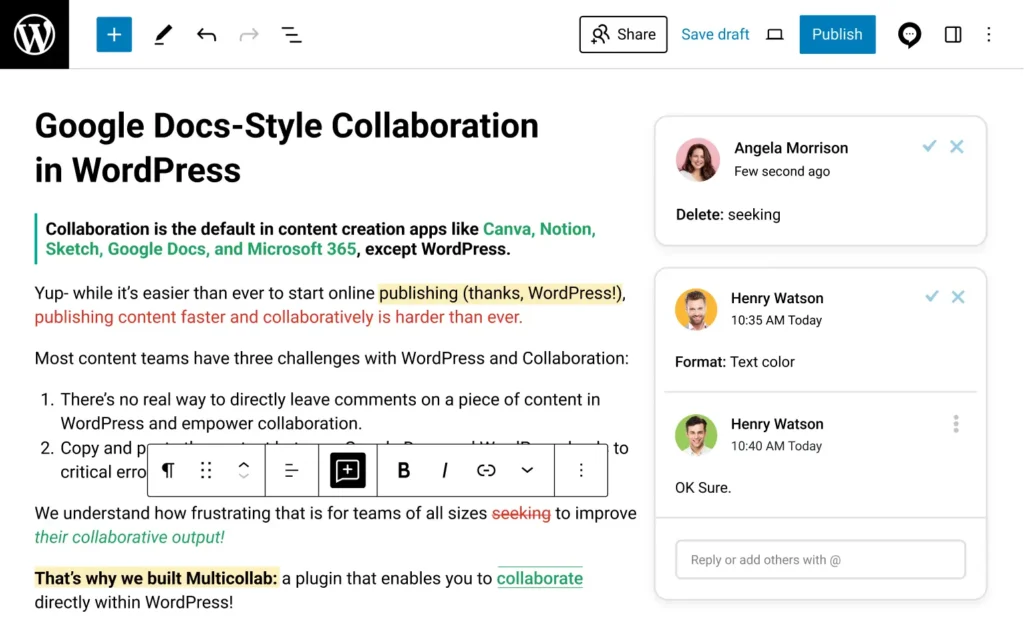
3. Team engagement and collaboration
A productive team isn’t just measured by output and quality—it’s also about how well they work together. Team engagement can be evaluated by tracking:
Participation rates: How often team members contribute to discussions and feedback loops.
Collaboration frequency: The number of interactions and cooperative efforts on projects.
Engaged teams tend to collaborate effectively, leading to faster turnarounds and better outcomes.
Multicollab promotes a culture of collaboration with tools like inline comments for contextual feedback and Slack notifications to keep everyone updated. These features encourage team participation, ensuring no voice goes unheard and fostering a more connected, productive environment.
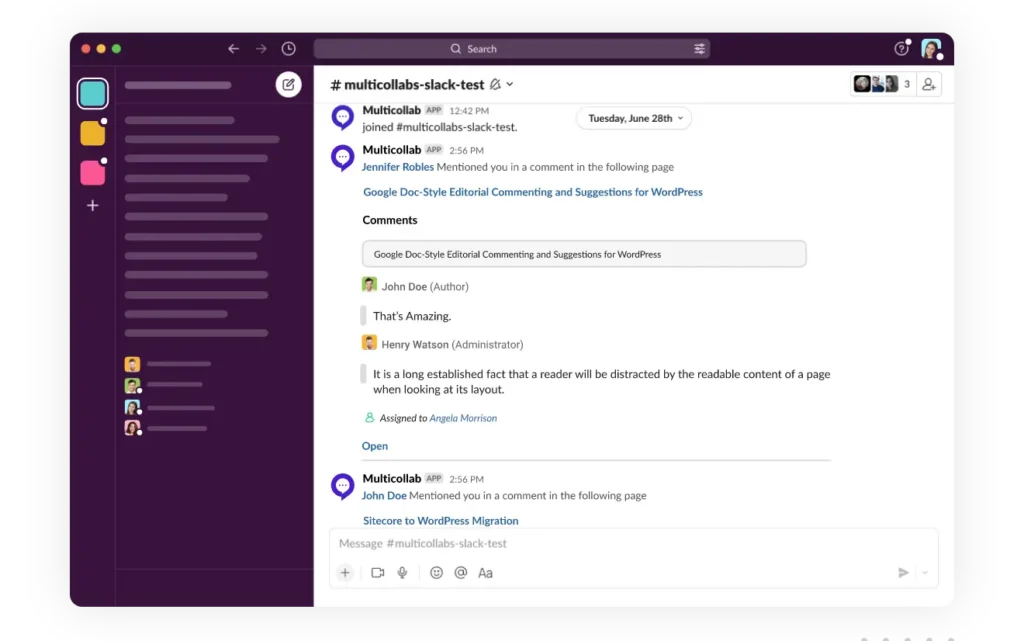
By focusing on these metrics, content managers can gain a comprehensive view of their team’s performance and address any inefficiencies before they hinder success.
The role of Multicollab in improving performance metrics
Evaluating and enhancing performance metrics becomes significantly easier with the right tools. Multicollab empowers content teams to improve efficiency, quality, and engagement through its robust collaboration features. Here’s how:
Reducing editing time
One of the biggest challenges for large content teams is managing lengthy editing cycles. Frequent back-and-forths between writers, editors, and reviewers can slow down production and create bottlenecks.
With Multicollab’s real-time collaboration and suggestion mode, team members can work together seamlessly without waiting for multiple review rounds. Writers can implement feedback directly within the document while editors provide instant, trackable suggestions. This eliminates unnecessary delays and speeds up the entire process.
Improved content quality
Refining content to meet high standards is a top priority for any content team. However, achieving this can be a challenge when feedback is scattered or unclear.
Multicollab’s collaborative feedback features—like inline comments and real-time updates—enable teams to address issues efficiently. Editors and reviewers can provide precise, actionable feedback directly within the document, ensuring that content is polished and ready for publication. The tool’s intuitive interface fosters clear communication, reducing misunderstandings and enhancing overall quality.
Tracking team performance
Understanding how a team performs is vital for long-term success. Without clear data, managers can struggle to identify strengths, weaknesses, and areas for improvement.
Multicollab offers advanced reporting and activity tracking features, giving managers valuable insights into their team’s productivity and engagement levels. You can monitor:
- The number of edits and contributions by each team member.
- Completion times for projects and tasks.
- Overall collaboration trends within the team.
These insights allow managers to make data-driven decisions, improve workflows, and ensure the team remains aligned with organizational goals.
Measuring and analyzing data for improvement
To elevate the performance of large content teams, measuring and analyzing data is essential. By using advanced analytics, teams can uncover patterns, identify bottlenecks, and implement data-driven strategies to improve productivity and content quality.
Advanced analytics and reporting in Multicollab
Multicollab’s robust reporting tools make it easier than ever to track and analyze key performance indicators (KPIs). These features provide actionable insights into team productivity, content progress, and collaboration trends.
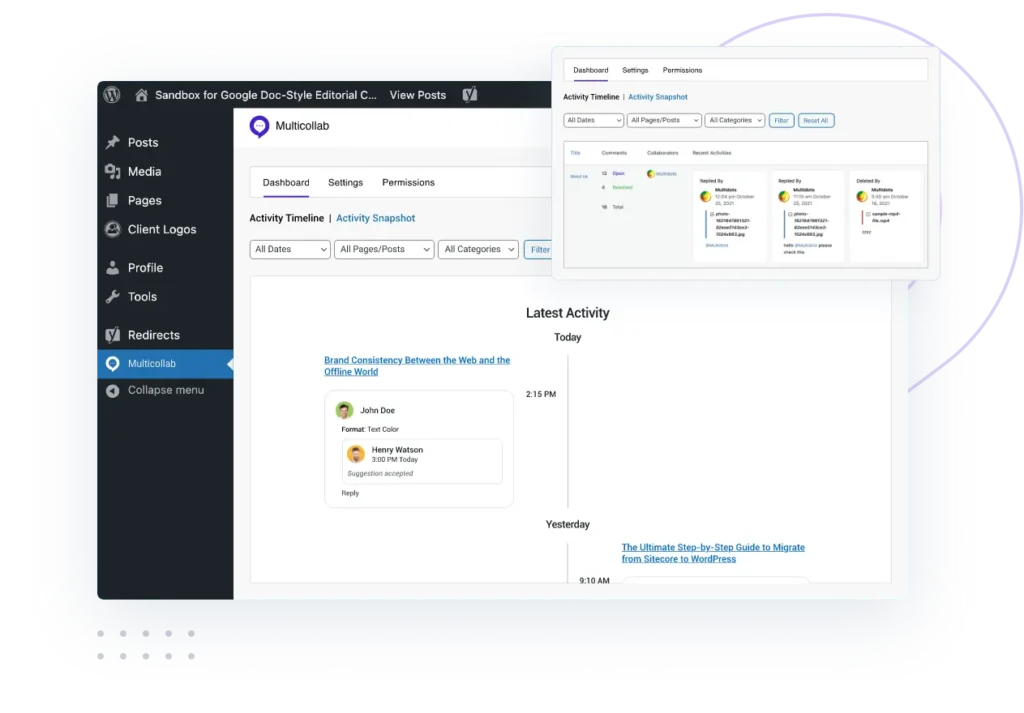
Activity Timeline: Tracks the entire content lifecycle, showing who made edits, added comments, or suggested revisions. This timeline ensures complete transparency and helps managers monitor progress in real time.
Engagement Metrics: Highlights how often team members contribute and interact, offering a clear picture of collaboration dynamics.
Performance Insights: Identifies areas where workflows excel or fall short, enabling teams to focus on specific improvements.
Imagine a team working on a high-volume blog series. Using the activity timeline, the manager can:
- Monitor how content moves from draft to completion.
- Identify contributors who are driving progress or need additional support.
- Pinpoint delays in the editing cycle and address them immediately.
Setting goals and KPIs
Effective content teams don’t just track data—they use it to set meaningful goals and KPIs that align with broader business objectives.
- Start by outlining your team’s primary objectives, such as increasing content output, reducing turnaround times, or improving engagement rates.
- Break these objectives into measurable KPIs, such as the number of articles published per month or the average time taken to finalize content.
Evaluating and interpreting data:
- Regularly analyze the metrics provided by tools like Multicollab to understand trends and performance gaps.
- Use these insights to set improvement strategies, such as reallocating resources, introducing new workflows, or enhancing training programs.
Encourage team participation in setting KPIs. Involving team members fosters accountability and ensures everyone understands their role in achieving shared goals.
Best practices for improving content team performance
Implementing efficient feedback loops
Feedback is the cornerstone of high-quality content. Streamlining the feedback process ensures that teams can address issues quickly and efficiently.
- Use inline comments to provide targeted, contextual feedback within content drafts.
- Leverage mentions to notify specific team members about critical updates or changes.
- Enable suggestion mode to propose edits without altering the original content, making it easy to review and approve changes.
Multicollab’s collaboration features eliminate the chaos of scattered feedback by keeping all suggestions and discussions within the WordPress interface. This reduces miscommunication, accelerates revisions, and ensures alignment across the team.
Fostering team accountability
Clear roles and responsibilities help prevent confusion and ensure that every team member contributes effectively. Accountability leads to more organized workflows and better outcomes.
- Define roles for each stage of the content process—writing, editing, reviewing, and publishing.
- Assign specific team members to tasks and deadlines to avoid overlap or missed steps.
- Use tools that track contributions and ensure accountability for each task.
Multicollab’s permissions and user assignment features allow managers to control who can edit, comment, or suggest changes. This ensures that everyone knows their role, fostering a more organized and responsible team dynamic.
Continuous learning and iteration
High-performing teams are always evolving. Regularly reviewing performance metrics and adapting workflows is key to staying efficient and productive.
- Schedule periodic reviews to analyze performance metrics like output, quality, and engagement.
- Encourage team members to share feedback on workflows and tools to identify areas for improvement.
- Experiment with new strategies and refine processes based on data insights.
Multicollab’s analytics and reporting tools provide the insights teams need to make informed decisions. By reviewing collaboration data and activity timelines, managers can identify bottlenecks, streamline workflows, and ensure steady progress.
Conclusion
Tracking key performance metrics is essential for the success of large content teams. By evaluating content output, quality, and team engagement, managers can gain valuable insights into their team’s strengths and areas for improvement. These metrics not only highlight performance gaps but also guide actionable strategies to enhance productivity and content quality.
Multicollab’s innovative features such as real-time collaboration, suggestion mode, and advanced reporting tools make it easier than ever to streamline workflows, foster collaboration, and achieve measurable results. With these tools, teams can reduce editing time, enhance content quality, and drive better engagement across the board.
Ready to transform your content team’s performance? Start exploring how Multicollab can help you achieve your goals today!



